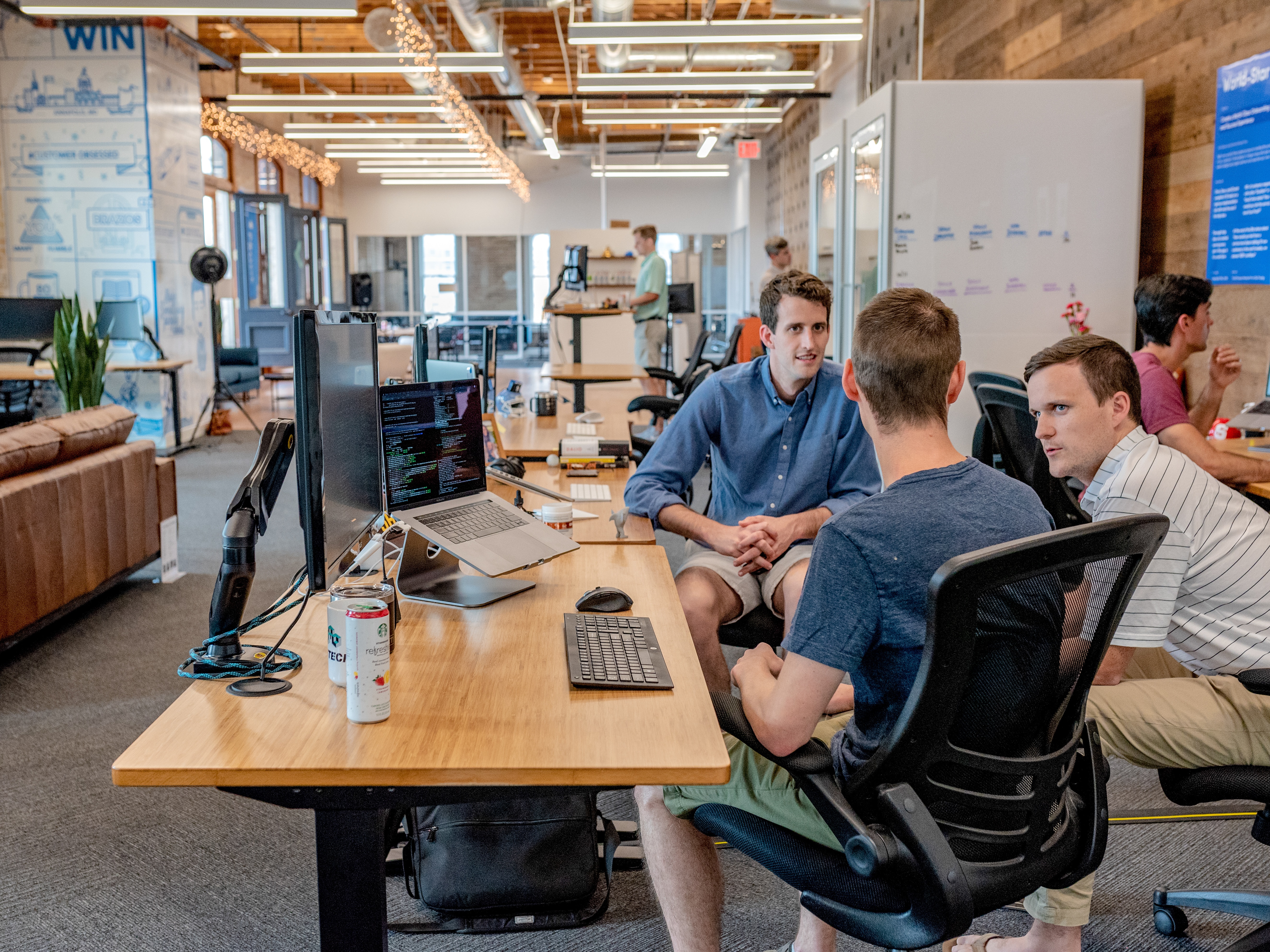While Silicon Valley debates whether AI will replace human workers, many small businesses are succeeding with a quieter, more human-centered approach.
According to ActivDev’s 2025 report, an independent consultant transformed their website into an AI-powered sales assistant. The result: a 40 percent increase in qualified meetings within three months, not by automating relationships, but by enhancing them. The AI engaged visitors in conversation, qualified prospects, and automatically scheduled personal follow-ups.
This story isn’t unique. Across regions, small and medium enterprises are discovering that successful AI adoption has less to do with technical capability and more to do with cultural intelligence.
Research summarized by Esade Business School and published in Current Opinion in Psychology (April 2025) found that between 50% and 59% of companies in China, India, and Singapore have already embraced AI, compared with only 26–33% in France, Spain, and the United States.
The researchers—Aaron J. Barnes, Yuanyuan Zhang, and Ana Valenzuela—concluded that this gap isn’t about technological sophistication but about cultural orientation. Collectivist cultures tend to view AI as a collaborative partner that enhances group success, while individualistic cultures often see it as a potential threat to autonomy and uniqueness.
This research suggests that cultural and relational dynamics—not just technology, determine AI adoption success. And in practice, your team’s personality and communication patterns often predict adoption outcomes better than your technical infrastructure.
For SMEs willing to embrace this reality, it’s a powerful advantage over enterprises still trapped in technology-first thinking.
Growth happens relationally. That’s why Cloverleaf’s AI Coach goes beyond individual productivity to understand your whole team—everyone’s goals, challenges, and relationships—to deliver coaching when teams need it most.
As a result, people respect their colleagues more and feel a stronger sense of belonging, while AI enhances rather than replaces the human connections that drive business success.
Get the free guide to close your leadership development gap and build the trust, collaboration, and skills your leaders need to thrive.
The Cultural Oversight in AI Implementation at SME’s
The Great AI Divide: What SMEs Can Learn from Cultural Adoption Gaps
The numbers tell a revealing story about AI adoption that has little to do with access to technology. EU enterprises using AI reached just 13.5% in 2024, up from 8.0% in 2023—despite world-class infrastructure and regulatory clarity under the EU AI Act.
By contrast, public sentiment toward AI is overwhelmingly positive across parts of Asia. According to the Stanford HAI 2025 AI Index Report, 83% of people in China, 80% in Indonesia, and 77% in Thailand view AI products and services as more beneficial than harmful.
This divide isn’t about economic development or technical maturity—it’s rooted in cultural psychology. As the research summarized by Esade Business School explains, individualistic cultures often perceive AI as a threat to autonomy and uniqueness, while collectivist cultures tend to see it as an extension of self—a collaborative partner that promotes harmony and shared progress.
The implication for business leaders is profound: when Western organizations implement AI with individualistic assumptions—focused on personal productivity and competitive advantage—they can unintentionally trigger cultural resistance.
Companies that understand their team’s cultural orientation can design AI experiences that feel natural, trustworthy, and human-supportive instead of threatening.
The Hidden Cost of Cultural Misalignment In Small-Mid Size Business
Here’s what most AI consultants won’t tell you: 45% of AI implementations fail not because of technical issues, but because of cultural resistance.
Companies spend millions on sophisticated AI platforms only to watch them gather digital dust because they ignored the human factors that determine adoption.
Consider the typical enterprise AI rollout: executives announce the new system, IT provides technical training, and managers are expected to drive adoption through mandate. This approach treats people as interchangeable components rather than individuals with distinct personalities, communication styles, and change preferences.
The financial impact is staggering. According to McKinsey’s 2025 State of AI report, only 1% of company executives describe their generative AI rollouts as “mature,” indicating that most organizations have yet to see organization-wide, bottom-line impact from AI use.
The underlying issue is cultural alignment. Individualistic cultures (common in the U.S. and Europe) tend to view AI as a tool for personal productivity, while collectivist cultures (Asia, Latin America) see it as a collaborative partner that enhances group success.
The same dynamic plays out inside organizations: teams that frame AI as augmenting relationships and shared goals adopt it faster than those that see it as a personal threat.
Why Most AI Advice Fails Small Businesses
Most organizations—and the consultants advising them—still treat AI adoption as a technical problem rather than a human one. Most AI coaching solutions focus on individual productivity, offering generic advice that ignores the relational context where real work happens.
This is where Cloverleaf takes a radically different approach. We’re not a chatbot or agent providing one-size-fits-all responses.
Instead, our AI Coach is team-intelligent because it uses people-informed data—understanding your team’s personalities, communication styles, motivators, and friction points to deliver coaching that strengthens relationships rather than replacing them.
Learn more about how AI and human coaching work together
The difference matters because growth happens relationally. When AI coaching can help people understand how their colleagues prefer to communicate, make decisions, and respond under stress, it builds the empathy and awareness that drive team effectiveness.
See Cloverleaf’s AI Coaching in Action
The SME Advantage: Size as a Superpower
The Intimacy Advantage: How Smaller Teams Keep AI Human
Small and medium-sized enterprises (SMEs) hold a quiet but powerful advantage in adopting human-centered AI.
Where large corporations struggle with bureaucracy and fragmented cultures, SMEs are naturally built for connection. Decision-makers stay close to the front lines, teams communicate directly, and change happens through relationships rather than policies.
This proximity makes it easier for small businesses to integrate AI in ways that enhance trust and collaboration instead of eroding them. According to the 2025 Rootstock manufacturing survey, over half of manufacturers (53%) prefer collaborative AI tools—systems that work with people rather than automate them away.
In smaller firms, this preference reflects more than efficiency—it reflects identity. Their competitive edge comes from the very human closeness that allows AI to strengthen culture instead of fragmenting it.
Cultural Agility: The Hidden Strength of Small Teams
Agility isn’t just about speed—it’s about sensitivity to context.
SMEs can quickly sense when an AI workflow supports their values—or when it doesn’t. With fewer approval layers, they can refine adoption in real time, tuning technology to fit their communication style, leadership rhythm, and team personality.
That adaptability gives them a unique edge with AI-driven coaching and development.
While large organizations deploy one-size-fits-all solutions, SMEs can personalize AI interactions around how their teams actually think and collaborate.
Cloverleaf’s data show that teams using its team-intelligent coaching framework are 86 percent more effective, reporting 33 percent stronger teamwork and 31 percent better communication.
These gains come not from faster automation, but from deeper empathy—the kind of alignment that builds belonging.
What’s the biggest mistake SMEs make when implementing AI? Treating it as a substitute for human relationships rather than an amplifier.
According to analysis from Shape the Market, a UK-based digital agency, many of its small business clients using ChatGPT for marketing reported positive ROI within three to four months—particularly when they treated AI as a tool to amplify human creativity and judgment rather than replace it.
The takeaway: AI succeeds when it amplifies what makes your people valuable—turning human insight, empathy, and connection into scalable strengths rather than automating them away.
The Relationship ROI: How Human Connection Drives AI Success
For small and mid-sized businesses, the most transformative returns on AI are relational, not just operational.
The organizations seeing measurable results are the ones using AI to listen, anticipate, and personalize—whether that means re-engaging customers at risk of churn or supporting employees with timely insights.
This philosophy mirrors Cloverleaf’s own experience: when AI helps people understand one another—how colleagues prefer to communicate, make decisions, and respond under pressure—adoption happens naturally.
As customer, Christy Cole from McKinney put it, “It’s the first tool I’ve seen that people adopted without prompting; even resistant team members became internal advocates.
The lesson is simple but profound: size is a superpower when it’s paired with cultural awareness. SMEs can move faster, stay more authentic, and make AI feel like an extension of their team—something that strengthens the very human qualities large enterprises often lose in scale.
The Assessment Advantage: Behavioral Science Meets AI
Behavioral Readiness: The Real AI Advantage
Here’s a research-backed truth that challenges conventional thinking about AI readiness: how people respond to change predicts success more reliably than how advanced their technology is.
A 2025 study published in Applied Sciences on AI adoption in European SMEs found that internal capabilities—such as adaptability, collaboration, and innovation mindset—have a greater impact on AI success than external funding or technical infrastructure. In other words, culture—not just code—determines whether AI thrives.
This insight aligns with decades of behavioral science. Validated assessments like DISC, Enneagram, 16 Types, and CliftonStrengths® help leaders understand how individuals process change, make decisions, and collaborate under pressure.
These behavioral insights reveal who will lean into new tools, who might hesitate, and how teams can align more effectively during transformation.
Yet most AI coaching tools stop at the individual level. They might tell you what to do next, but not why it matters for your specific team dynamics—or how to adapt guidance to your colleagues’ communication styles and motivations.
Cloverleaf takes a fundamentally different approach.
Our AI Coach is team-intelligent, not task-intelligent. It integrates behavioral assessments to understand how your team works together—the personalities, motivators, and friction points that shape collaboration—and then delivers timely coaching that strengthens relationships rather than ignoring them.
The result: AI that doesn’t just make work faster, but makes teams more self-aware, adaptive, and connected.
The Science Behind Cloverleaf
Our approach combines three elements that other AI coaching platforms miss:
1. Understands the team, not just the person. While other AI coaches provide generic advice based on individual queries, Cloverleaf’s AI Coach knows who you work with, how they communicate, and where friction or misalignment might occur.
2. Grounded in real data. Instead of relying on static surveys or generic prompts, our system combines behavioral assessments, team relationships, and collaboration patterns based on how work actually happens in your organization.
3. Delivered in the flow of work. Coaching arrives inside the tools people already use—Slack, Teams, calendars—so development is integrated and practical rather than an additional burden.
The Future of Human-AI Collaboration for SMEs
The conversation about AI and work has been dominated by a false choice: humans or AI. This binary thinking misses the real opportunity for small and medium enterprises to create competitive advantages through thoughtful human-AI collaboration.
According to Deloitte’s State of Generative AI 2024 report, 60% of professionals believe their organizations are effectively balancing the rapid integration of AI with risk management, while 72% report increasing trust in AI since 2022. That trust isn’t built by technology alone—it grows when AI is implemented in ways that strengthen human capability, not diminish it.
The Choice Ahead: Will Your AI Strategy Scale Trust or Replace It?
As AI continues to reshape how we work, small and medium enterprises face a critical decision: Will you implement AI in ways that enhance human relationships or undermine them?
The evidence is clear. Cultural intelligence drives adoption more than technical sophistication. Behavioral readiness predicts sustainable outcomes better than infrastructure. And organizations that build relational intelligence into their AI strategy are already gaining advantages that scale with every interaction.
Ready to unlock your team’s AI potential through cultural intelligence?
Discover how Cloverleaf’s assessment science approach can help you implement AI without losing the human touch that makes your organization unique.
Our team-intelligent AI Coach understands not just individual personalities, but the relationships and dynamics that drive team success.
Because growth happens relationally. And the future belongs to organizations that understand how to make AI serve human connection rather than replace it.
Cloverleaf is trusted by 45,000+ teams to build trust and improve team performance through science-backed AI coaching. Our platform is SOC 2 Type II compliant, ISO/IEC 27001 certified, and GDPR-aligned, ensuring your team’s data is safe, encrypted, and never used for anything other than their development.





